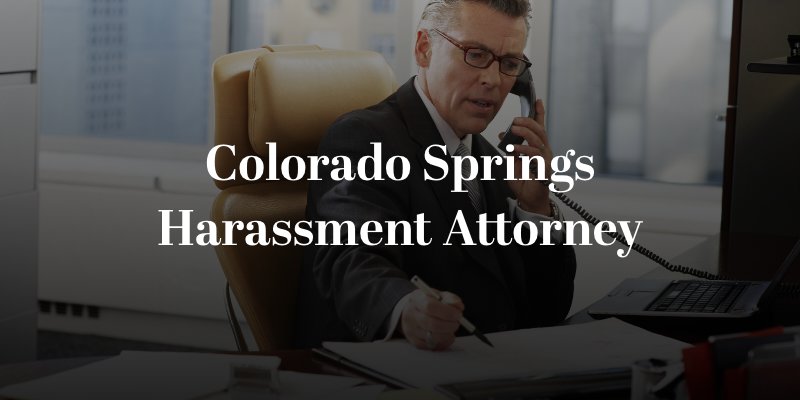Colorado Springs Harassment Attorney
Facing harassment charges in Colorado Springs can be incredibly scary, and carries with it serious implications for your personal and professional life. The stigma, confusion, and legal complexities surrounding such allegations require a comprehensive understanding of the law and the local court system. The best way to protect yourself and your future is to work with an experienced criminal defense attorney. Let us help you today. Contact Anaya & Chadderdon today to schedule a free consultation.

Why Hire Anaya & Chadderdon When Facing Harassment Charges?
When faced with harassment charges in Colorado Springs, one of the most important decisions you’ll make is which attorney you work with. Here’s why Anaya & Chadderdon should be your top choice:
Experience
With a combined experience exceeding 30 years, we bring depth of knowledge and significant courtroom expertise. This provides us with an understanding of the law and how these matters are treated by prosecutors and judges.
Your Case is Handled By a Partner
At Anaya & Chadderdon, we ensure that every case is handled directly by a partner — no exceptions. You benefit from experienced lawyers dedicated to defending your rights; we don’t ever hand off essential tasks to less experienced associates.
Clear Communication
Clear communication stands as one of our core principles; you will receive prompt responses to your inquiries, ensuring you’re always in the loop regarding your case’s status.
We understand the anxiety that accompanies legal challenges, and we will do everything we can to help you.
How an Attorney Can Help You With a Harassment Charge
Dealing with a harassment charge is overwhelming and isn’t something anyone wants to face, but an arrest and criminal charges doesn’t mean there is no hope; having an experienced attorney by your side can make all the difference. Your attorney helps in several critical ways:
Investigation
Your lawyer will thoroughly investigate the circumstances surrounding your charges, seeking out any inconsistencies or weaknesses in the prosecution’s case. Gathering crucial evidence and identifying favorable witnesses are primary strategies that could lead to a successful outcome.
Negotiation with Prosecutors
There’s often room for negotiation before a trial becomes necessary. An experienced attorney knows how to navigate these discussions effectively, striving for outcomes such as reduced charges or alternative sentences which may not involve court proceedings.
Representation at Trial
If going to trial is unavoidable, having an attorney represent you ensures that your case is presented in the most favorable light possible. Your lawyer will meticulously prepare for trial, developing a strong defense strategy while also preparing to challenge the prosecution’s evidence and witnesses.
Navigating the intricacies of a harassment charge requires expert legal guidance and support. An experienced attorney not only offers much-needed help with the legal process, but also gives you peace of mind.
What is Harassment in Colorado?
Harassment is defined as engaging in conduct that is meant to annoy or alarm another person. This can manifest through various actions aimed at bothering, annoying, or alarming someone. A range or behaviors can fall under this statute, including:
- Spitting on someone
- Repeatedly calling someone and hanging up
- Sending threatening emails or text messages
- Following a person in a public place
- Repeatedly insulting, taunting, or challenging someone in a manner that’s likely to provoke a violent or disorderly response
“A person commits harassment if, with intent to harass, annoy, or alarm another person, he or she:
- Strikes, shoves, kicks, or otherwise touches a person or subjects him to physical contact; or
- In a public place directs obscene language or makes an obscene gesture to or at another person; or
- Follows a person in or about a public place; or
- Repealed.
- Directly or indirectly initiates communication with a person or directs language toward another person, anonymously or otherwise, by telephone, telephone network, data network, text message, instant message, computer, computer network, computer system, or other interactive electronic medium in a manner intended to harass or threaten bodily injury or property damage, or makes any comment, request, suggestion, or proposal by telephone, computer, computer network, computer system, or other interactive electronic medium that is obscene; or
- Makes a telephone call or causes a telephone to ring repeatedly, whether or not a conversation ensues, with no purpose of legitimate conversation; or
- Makes repeated communications at inconvenient hours that invade the privacy of another and interfere in the use and enjoyment of another’s home or private residence or other private property; or
- Repeatedly insults, taunts, challenges, or makes communications in offensively coarse language to, another in a manner likely to provoke a violent or disorderly response.”
Penalties For Harassment
Harassment is a serious offense with penalties varying based on the severity and nature of the behavior. Here’s an explanation of the penalties for harassment, depending on whether it’s classified as a petty offense or a misdemeanor:
Petty Offense Harassment
Harassment is considered a petty offense when it involves using obscene language or making obscene gestures directed at another person in a public place.
Penalties for a petty offense can include up to 10 days in jail and/or fines of up to $300.
Class 1 Misdemeanor Harassment
This class of misdemeanor includes more serious forms of harassment, such as following a person in a public place, unlawfully touching someone, or engaging in discrimination-based harassment due to the victim’s race, color, religion, ancestry, national origin, physical or mental disability, or sexual orientation.
The penalties for a Class 1 misdemeanor can be more severe, including up to 364 days in jail and/or fines of up to $1,000.
Other Forms of Harassment (Class 2 Misdemeanor)
All other forms of harassment that do not fall under these categories are generally considered class 2 misdemeanors.
These carry penalties of up to 120 days in jail and/or fines of up to $750.
It’s important to understand that harassment is taken seriously by the legal system, and the consequences can be significant. The specific penalties depend on the nature of the harassment and the laws in the relevant jurisdiction.
Legal Defenses to Harassment
A defense strategy in a harassment case typically hinges on disproving the elements that constitute the offense. Here are some key defenses:
Lack of Intent
To be convicted of harassment, you must have intended to harass the person. If you are able to show that your behavior was misunderstood or taken out of context, this could lead to a not guilty verdict.
Falsely Accused
False accusations are unfortunately common in the criminal justice system. To show you were falsely accused, it’s helpful to explain the motive behind these false accusations – for example, jealousy or disputes in custody or divorce cases could lead to false accusations of harassment.
Misidentified
In cases where the offender is unknown to the victim, it’s possible that you were simply in the wrong place at the wrong time when you were arrested and then identified as the harasser. To show that you were misidentified, you can point to difficult visibility during the alleged offense or even provide an alibi, showing that you were somewhere else when the offense took place.
The exact defense used in your case will be determined by your lawyer and will depend on the specifics of the situation.
Contact Anaya & Chadderdon To Schedule a Free Consultation
If you are facing harassment charges, securing experienced legal representation is essential. Our expertise and diligence can make a significant difference in the outcome of your case. Contact Anaya & Chadderdon today to schedule a free consultation.
